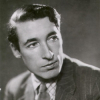Louis MacNeice

Louis MacNeice
Frederick Louis MacNeice CBEwas an Irish poet and playwright. He was part of the generation of the Auden Group, also sometimes known as the "Thirties poets", that included W. H. Auden, Stephen Spender and Cecil Day-Lewis, nicknamed collectively "MacSpaunday" – a term coined by Roy Campbell, in his Talking Bronco. MacNeice's body of work was widely appreciated by the public during his lifetime, due in part to his relaxed, but socially and emotionally aware style. Never as overtlypolitical as some...
NationalityBritish
ProfessionPoet
Date of Birth12 September 1907
My sympathies are Left. On paper and in the soul. But not in my heart or my guts.
I have just finished my novel (rough draft). It is to be called 'Anacoluthon.' This will make the public think it is an historical romance.
I do not envy any animal, though I envy many of their capacities.
I am more proud of what distinguishes man from the animals than of what he has in common with them.
I am 33 years old, and what can I have been doing that I still am in a muddle? But everyone else is, too; maybe our muddles are concurrent.
Man is an unhappy animal and one that can talk. If he was not unhappy, he would have nothing to talk about. But if he had nothing to talk about, he would be unhappy.
In writing 'A Portrait of Athens' I have attempted - rather impressionistically - to give a panorama of its present. But I have also brought in its past because I sincerely think that there is a continuity.
It is a retrogression when human beings begin to insist on uniform, on one-mindedness, on conditioning their offspring so that all their reactions are automatic.
World is suddener than we fancy it.
And I envy the intransigence of my own Countrymen who shoot to kill and never See the victim's face become their own Or find his motive sabotage their motives.
There seeps from heavily jowled or hawk-like foreign faces The guttural sorrow of the refugees.
We are all fed from hundreds and thousands of hands. Often we do not know whose they are nor how they work. Only a few of us ever visualize the hands that grope in the coal mines or push levers in the mills or handle axes in the lumber camp.
Time was away and somewhere else, / There were two glasses and two chairs / And two people with one pulse.
The poet has no greater number of muscles than the ordinary conversationalist; he merely has more highly developed muscles and better coordination. And he practises his activity according to a stricter set of rules.